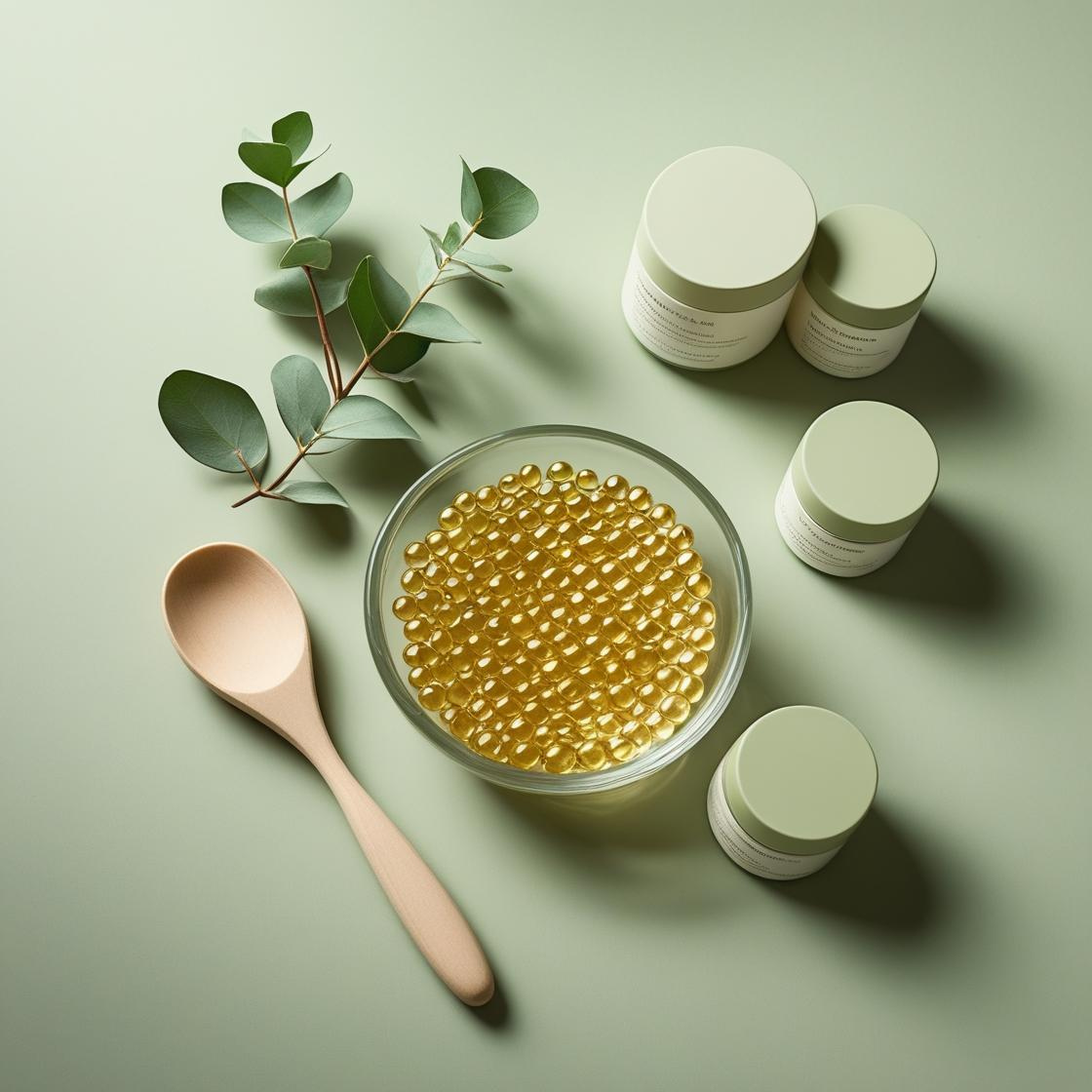CAS number 92457-12-0, 8001-78-3
INCI name Hydrogenated jojoba oil, hydrogenated castor oil
Tiny, spherical beads are composed of natural jojoba oil and castor oil, ensuring gentle yet effective exfoliation due to their smooth, round structure. With a 40/60 mesh size and a white or vanilla hue, they are cruelty-free and specially formulated for delicate skin, making them ideal for exfoliating the face, lips, and cuticles.
Purpose
Jojoba beads provide gentle but effective exfoliation without the abrasiveness of other exfoliants, making them ideal for removing dead skin cells while maintaining skin health. They are non-occlusive and non-comedogenic, allowing the skin to breathe freely while exfoliating without clogging pores. Their very mild nature makes them suitable for sensitive skin, making them a great choice for daily use and delicate skin types.
Origin
Jojoba beads originate from jojoba oil, which is extracted from the seeds of the Simmondsia chinensis plant, native to desert regions of North America, including the southwestern United States and northern Mexico. The beads are formed through the hydrogenation of jojoba oil, transforming it into a stable, biodegradable, and eco-friendly exfoliant. Some formulations may also include castor oil derivatives to enhance their texture and effectiveness.
| Feature | Description |
| Name | Jojoba beads |
| Type | Natural, Biodegradable Exfoliant |
| Source | Derived from Jojoba Oil, extracted from the seeds of the Simmondsia chinensis plant |
| PH | 6-7 |
| Color | Available in a range of colors (white, yellow, red, green, blue, etc.) for aesthetic appeal |
| Odor | Odorless |
| Solubility | Insoluble in water |
| Physical form | Small, smooth, and spherical beads |
| Concentration | 1-10% |
| Melting point | 82-90°C |
Molecular Similarity to Skin Sebum
Jojoba oil closely mimics the natural sebum produced by human skin, making it highly biocompatible. This similarity allows it to be absorbed effortlessly without disrupting the skin’s natural barrier. Unlike other oils that may sit on the surface, jojoba oil penetrates deeply, delivering hydration at a cellular level while maintaining the skin’s moisture balance. This makes it an ideal ingredient for facial oils, moisturizers, and treatments designed for all skin types.
Non-Comedogenic & Non-Occlusive
Jojoba oil is uniquely structured to be non-comedogenic, meaning it does not clog pores. Unlike heavier oils that can create an occlusive layer, trapping dirt and bacteria, jojoba oil allows the skin to breathe while still providing essential hydration. This makes it particularly beneficial for individuals with acne-prone or oily skin, as it provides moisture without contributing to breakouts.
Highly Stable & Resistant to Oxidation
One of the rarest qualities of jojoba oil is its exceptional stability. Unlike many plant-based oils that degrade over time, jojoba oil is composed primarily of wax esters rather than triglycerides, giving it an extended shelf life of five years or more. It does not go rancid easily and remains resistant to oxidation, meaning it does not require preservatives to maintain its quality. This makes it a preferred ingredient in natural and organic skincare formulations.
Rich in Natural Waxes & Esters
Jojoba oil is technically a liquid wax rather than a traditional oil, consisting of long-chain fatty acids and esters. These wax esters provide a silky-smooth texture that enhances cosmetic formulations. Unlike triglyceride-based oils that break down quickly, the waxy composition of jojoba oil makes it more durable and resistant to microbial contamination.
Deeply Penetrating & Lightweight
Due to its small molecular structure, jojoba oil easily absorbs into the skin without leaving a heavy or greasy residue. It offers long-lasting hydration by reinforcing the skin’s natural lipid barrier while maintaining a lightweight feel. This makes it a staple in skincare products such as facial serums, lotions, and even oil-control formulations, as it hydrates without excessive shine.
Oil-Balancing Properties
Jojoba oil is known for its ability to regulate sebum production. Because it closely resembles the body’s natural oils, it can send signals to the sebaceous glands, preventing excessive oil production in oily skin types. Conversely, in dry skin, it provides necessary moisture, restoring balance. This dual-action benefit makes it suitable for all skin types, including those with combination skin concerns.
Anti-Inflammatory & Healing
Packed with vitamin E, B-complex vitamins, and antioxidants, jojoba oil has potent anti-inflammatory properties that help soothe irritated skin. It reduces redness, calms sensitive skin, and aids in the healing process for conditions like eczema, psoriasis, and sunburn. Its ability to repair the skin’s barrier function makes it a go-to ingredient for individuals with compromised or inflamed skin.
Natural Antibacterial & Antifungal Properties
Jojoba oil contains compounds that naturally inhibit the growth of certain bacteria and fungi. This makes it beneficial for acne treatments, as it helps to reduce the presence of acne-causing bacteria without disrupting the skin’s microbiome. It is also useful in scalp care, helping to reduce dandruff and irritation by combating fungal overgrowth.
Versatile & Multi-Purpose
Jojoba oil is highly versatile and can be used in various applications, including skincare, haircare, lip care, and even makeup formulations. It is commonly found in moisturizers, cleansers, shampoos, conditioners, lip balms, and shaving products. Its ability to provide hydration while remaining non-greasy makes it a universal ingredient across different product categories.
Applications of Jojoba Oil
Skincare
Jojoba oil is widely used in skincare products due to its versatility and beneficial properties. It is used as a moisturizer for the face and body, offering hydration without clogging pores. Its non-comedogenic nature makes it especially suitable for acne-prone and oily skin. It also works as a makeup remover, gently dissolving makeup and impurities while nourishing the skin. Jojoba oil is found in anti-aging creams, as it helps to restore the skin’s natural barrier and promote elasticity, reducing the appearance of fine lines and wrinkles.
Haircare
In haircare, jojoba oil serves as a deep conditioner, providing moisture to dry, brittle hair and promoting shine without weighing it down. It is used in shampoos and conditioners to help balance the scalp’s oil production, making it ideal for both oily and dry scalps. It is also used in hair serums to reduce frizz, enhance smoothness, and protect hair from environmental damage. Additionally, jojoba oil is included in products that address dandruff, as its natural antifungal and antibacterial properties can help maintain a healthy scalp.
Lip Care
Jojoba oil is commonly used in lip balms and lip glosses because it provides long-lasting hydration without the greasiness of other oils. It helps soothe dry, cracked lips and restore softness. Additionally, it is used as a lip scrub ingredient, gently exfoliating and conditioning the lips to keep them smooth and moisturized.
Shaving Products
Jojoba oil is used in shaving creams and aftershave products due to its ability to hydrate and protect the skin. It helps to soften the skin before shaving, reducing irritation and razor burn. After shaving, it provides a soothing effect, reducing inflammation and promoting skin healing.
Body Care
In body care, jojoba oil is found in body lotions, creams, and body oils. Its deeply moisturizing properties make it effective in treating dry skin, providing nourishment and smoothness. Jojoba oil is also used in hand and cuticle creams due to its ability to soften and hydrate rough, dry skin around the hands and nails.
Massage Oils
Jojoba oil is often used as a base oil in massage oils due to its smooth texture and skin-penetrating properties. It helps lubricate the skin for a relaxing massage while nourishing and softening the skin.

